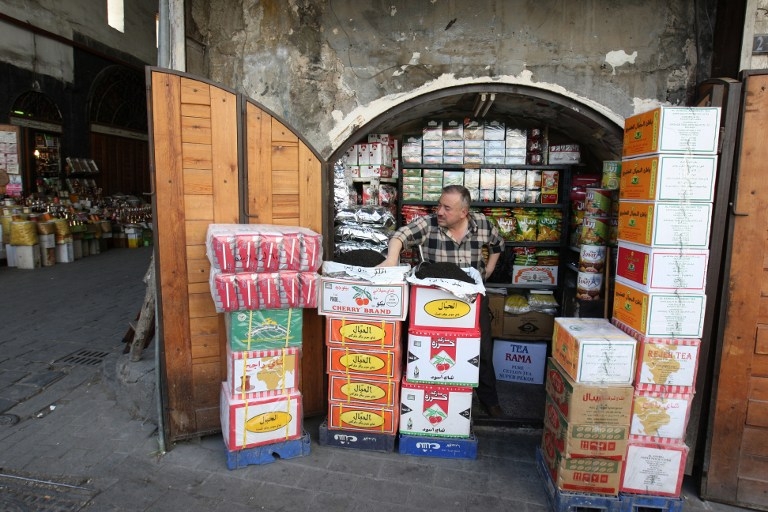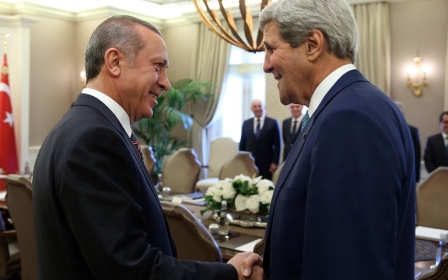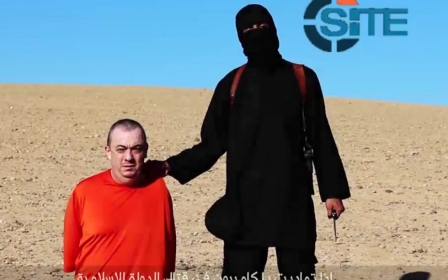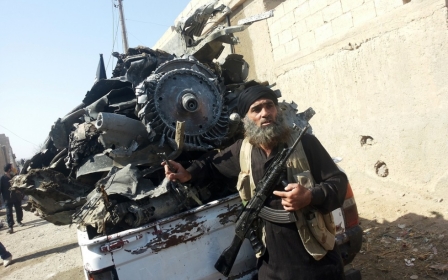In Syria, government hopes and people despair

DAMASCUS - "In the fight against terrorism, Washington and its coalition are in the same trench as the Syrian army,” boasted the banner headline in the pro-government newspaper, Al-Watan, this morning.
It was a dramatic sign of the Syrian government's hopes that there may be soon be a common front between itself and the West against the Islamic State and other militant groups fighting here.
There were plenty of other similar signals in the way Syrian officials and the state-controlled media covered the US air strikes on the morning after. Accusations that the US acted in violation of international law or committed aggression against Syria were conspicuously absent, even though in advance of the attacks Walid Muallem, the Foreign Minister, had used those very arguments to warn against any US attack.
The contrast with the way Russia and Iran, its two allies, denounced the air attacks is striking.
Now that armed US intervention against IS in Syria has happened with more attacks expected in the coming days, President Bashar al-Assad is doing everything possible to be invited to join the coalition - or at least to be seen to be acting on the same track since Syria will never accept US leadership.
Wednesday’s press did find space to criticise the US strategy, but for not going far enough. It highlighted comments that Assad made to Faleh al Fayyad, the visiting Iraqi national security adviser. The Syrian president said military action was important but not sufficient to the battle against terrorism. What was needed was that states should co-operate and co-ordinate their efforts to stop funding terrorists and help them to cross international borders. He pointed out that this was the essence of the recent UN Security Council resolution that the US and other Western nations had endorsed.
Surprisingly perhaps, the president's remarks sounded more positive than the views of many people on the streets of Damascus on Wednesday. None of them saw the US strikes as a game-changer, for better or worse. War-weariness is the dominant mood. People either shy away from talking about the war or they say they see no hope anyway.
"I don't think this is the beginning of co-operation between the United States and the Syrian government because they're not good friends. Maybe they will co-operate but I doubt it,” said Emir Mureish, who runs a tiny shop selling pots, pans, and crockery in the Old City's Souk Hamidiya. His business, like that of every other shop-owner in the souk, is barely keeping afloat. In the five hours he had been open on Wednesday, he had sold one potato peeler.
Asked whether he thought the US might move from attacking IS to attacking Syrian government forces, he did not think it likely. "They won't destroy this relationship either by mistake or on purpose because there is no alternative to Syria's current government and president. If the Americans attack them, there would be chaos.”
Rula, a young woman in hijab walking past the walls of Damascus's ancient citadel, was more sceptical about American intentions. "This is not the beginning of co-operation between the US and the Syrian government,” she said. "The attacks are good, but only if the Americans are not going to do something afterwards to cause us trouble.” Most of the opposition who protested in the streets for reform in 2011 "now realise that it's a game and they were trapped,” she said.
Abu Nouri, a Shia who sells sunglasses, was also lukewarm about US policy. "If they only take care of ISIS, it would be OK. But I don't see it as the start of co-operation between the US and Syria. Unfortunately, we thought of Americans as people of technology and civilisation, but they shake hands with Saudis who send terrorists against us.” The war, he said, had forced Syrians into violence. "Before the crisis, people despised weapons. Now everyone carries a pistol,” he declared, and to prove his point, he pulled open a desk drawer and displayed his revolver. "If Assad leaves power, you'll see blood spewing out like from a fountain,” he added.
Out of five people willing to be interviewed in the privacy of their shops or away from by-standers, one was anti-government. Abu Omar (not his real name) said the war had gone on long enough and "the regime is killing civilians. Every family has lost someone. It's not credible to think all these places they are bombing are full of terrorists. What is wrong if they bring the regime down? It's just been killing people for three years already,” he said.
But he had no faith in US strategy either. "It's senseless to bomb ISIS because they've hidden themselves among people.” He saw nothing but despair ahead. His son had died while serving in the army. There were rumours that he had been shot while trying to defect but nothing was certain. His other grown-up children had had to move to his home because theirs were in suburbs that the government’s bombing had destroyed.
Asked when he thought the war would end, Abu Omar threw up his hands. "Everyone says it will go on for years,” he concluded.
Middle East Eye propose une couverture et une analyse indépendantes et incomparables du Moyen-Orient, de l’Afrique du Nord et d’autres régions du monde. Pour en savoir plus sur la reprise de ce contenu et les frais qui s’appliquent, veuillez remplir ce formulaire [en anglais]. Pour en savoir plus sur MEE, cliquez ici [en anglais].




